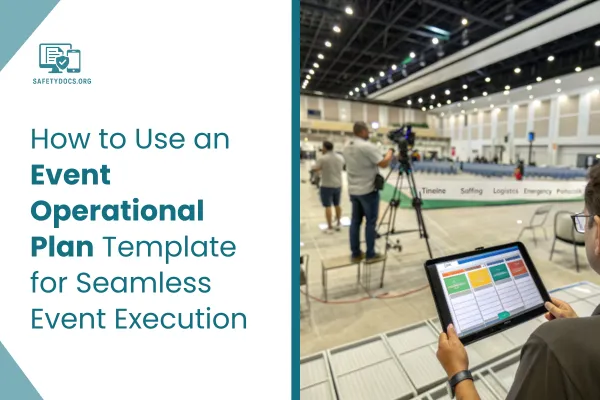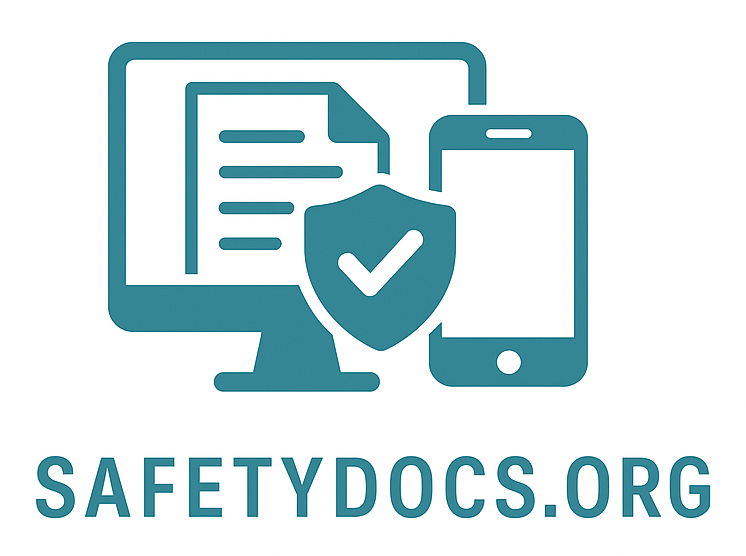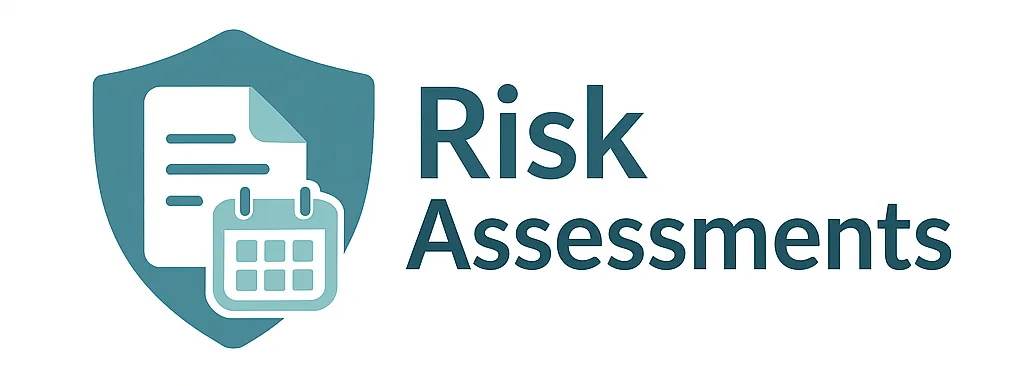
Event Operational Plan Template for Smooth Event Execution
How to Use an Event Operational Plan Template for Seamless Event Execution
When organizing an event, the planning process can often feel overwhelming. From coordinating logistics to assigning responsibilities, there's a lot to keep track of. However, with a comprehensive and well-thought-out plan, the process becomes much smoother. An event operational plan is a crucial document that helps event planners stay organized and ensure that every aspect of the event is accounted for.
Whether you're hosting a small corporate meeting, a wedding, a conference, or a large-scale festival, the key to success lies in detailed planning. A well-organized operational plan template acts as a roadmap, guiding event coordinators through all phases of the event, from the initial planning stage to the final wrap-up. In this blog post, we’ll explore how to effectively use an event operational plan template, providing a step-by-step breakdown of the essential components. By following this guide, you'll ensure that your event is well-executed, stays within budget, and leaves a lasting impression on your guests.
What is an Event Operational Plan?
An event operational plan is a detailed strategy that outlines how an event will be executed. This document includes all logistics, roles, responsibilities, and resources needed for the successful execution of the event. It serves as the playbook for event planners, ensuring that all tasks are assigned, all needs are met, and potential risks are mitigated. The purpose of the operational plan is to make the entire process more predictable, allowing for smoother execution and helping to avoid last-minute surprises.
Event operational plans are essential because they provide structure, clarify roles, and allow for effective communication among team members. Additionally, they ensure that there is a clear timeline and that everyone is aware of their responsibilities. By using a template, event planners can save time, maintain consistency, and focus on delivering an exceptional event experience.
Key Elements of an Event Operational Plan Template
An event operational plan template should cover several critical areas. Let’s break down the essential components that you must include in your template to ensure a successful event.
1. Event Overview:
The event overview section is where you provide a brief yet comprehensive description of the event. This includes the event’s name, date, time, venue, purpose, and target audience. The overview establishes the foundation for the entire plan, helping everyone involved understand the big picture. Additionally, outlining the event's goals and objectives will provide direction for the planning process.
2. Roles and Responsibilities:
One of the key aspects of an operational plan is defining the roles and responsibilities of everyone involved in the event. This includes staff members, volunteers, contractors, and even external vendors. Each person’s role should be clearly outlined, ensuring that there’s no overlap or confusion regarding tasks. By assigning clear responsibilities, you can ensure that every task gets completed, from setting up the venue to managing attendee registration.
3. Budget and Financial Management:
Budgeting is a critical element of event planning. The financial section of the event operational plan should outline all the anticipated costs, including venue rental, catering, decorations, transportation, entertainment, and staffing. It’s essential to allocate funds appropriately and track expenses to stay within the budget. If the event exceeds its budget, the organizer may need to scale down certain aspects or seek alternative funding sources.
4. Venue and Logistics:
The venue and logistics section details all the logistical elements of the event. This includes arranging transportation, setting up the venue, ensuring necessary equipment and supplies are available, and organizing parking and signage. It’s also important to make contingency plans for any issues that might arise, such as transportation delays or equipment failure. This section should address all aspects of the venue, from the arrival of vendors to the final teardown after the event.
5. Schedule and Timeline:
A clear timeline is crucial to keeping the event on track. This section should break down the event day(s) hour by hour, detailing each activity, from guest arrival to speeches, breaks, performances, and closing. The timeline should also include any pre-event activities, such as setting up the venue and rehearsal times. Every task and responsibility should be assigned a specific time slot to ensure that the event runs smoothly without delays.
6. Risk Management and Contingency Plan:
Every event faces potential risks, from weather-related disruptions to technical difficulties or no-shows from key speakers. The risk management section should outline possible risks and strategies for managing them. This includes creating contingency plans in case of emergencies, such as having backup venues or vendors in place or knowing what to do if equipment fails. Having these contingency measures in place will ensure that the event continues smoothly, even when faced with unexpected challenges.
7. Communication Plan:
A clear communication plan ensures that all team members, vendors, and stakeholders are aligned. This section outlines the communication process that will occur before, during, and after the event. It includes details such as regular team meetings, email updates, and the use of communication tools (e.g., Slack or WhatsApp) to keep everyone informed. Communication can help resolve issues quickly and keep things moving forward.
8. Event Evaluation:
After the event concludes, it’s essential to evaluate its success. The evaluation section outlines how feedback will be gathered, including through surveys, interviews, and discussions with attendees, staff, and vendors. This feedback helps identify areas for improvement and provides valuable insights for future events. The evaluation should also include a debrief with the team to discuss what went well and what could be done differently next time.
How to Create an Event Operational Plan Using the Template
Creating an event operational plan is straightforward, especially when using a template. Here are some steps to help you craft your plan:
1. Define Your Event Goals
Start by identifying the primary goals and objectives of your event. Do you want to raise funds, increase awareness, or create a memorable experience for guests? Understanding your goals will help guide all other planning decisions.
2. Fill in the Template’s Sections
Once you’ve determined the event’s goals, begin filling in each section of the template. Be as detailed as possible, especially when it comes to roles, timelines, and budgets. The more information you provide, the more precise your plan will be.
3. Assign Tasks and Deadlines
For each task outlined in your plan, assign a team member responsible for it and specify a deadline. Setting deadlines ensures that everything gets done on time, and assigning tasks ensures that no aspect of the event is overlooked.
4. Review and Revise
After filling in the template, review the plan carefully. Look for any gaps, overlaps, or inconsistencies. Revise the plan as needed and share it with your team for feedback. Everyone involved must be on the same page.
5. Test the Plan
Run through the plan a few weeks before the event to ensure everything is in place. Check all logistics and test equipment and confirm with vendors. A dry run helps identify any issues early and ensures you're fully prepared for the event.
Benefits of Using an Event Operational Plan Template
Using an event operational plan template can provide numerous benefits, including:
Improved Organization: A well-structured plan ensures that no detail is overlooked. It helps keep everything organized and on track, from the initial stages to the final event day.
Time-Saving: Templates save time by providing a predefined structure. This allows event planners to focus on customizing the plan instead of starting from scratch.
Better Budgeting: With a clear budget template, you can ensure that every aspect of your event is accounted for financially, preventing unexpected expenses from derailing the event.
Reduced Stress: Knowing that every detail is taken care of and having a clear plan in place helps reduce stress and increase confidence. Event planners can handle unexpected issues more easily with a backup plan in place.
Common Mistakes to Avoid When Using an Event Operational Plan Template
While templates provide a solid foundation, there are a few common mistakes that event planners should avoid:
1. Overlooking Important Details
It’s easy to forget small but essential details when filling out a template. Be sure to review every section carefully and double-check your timelines, responsibilities, and budget allocations.
2. Lack of Flexibility
Even with a detailed plan, it’s essential to remain flexible. Plans often need to be adjusted as circumstances change, such as last-minute venue changes or vendor issues. Be prepared to adapt.
3. Inadequate Communication
Communication is key to the success of any event. Ensure that all team members, vendors, and stakeholders are regularly updated on the plan’s progress and any changes.
4. Neglecting to Evaluate
After the event, don’t skip the evaluation process. Gathering feedback and analyzing what went well and what could be improved is crucial for future event planning.
FAQs
1. What should be included in an event plan?
An event plan should include details about roles, budget, timeline, venue logistics, and risk management. These elements ensure a smooth and organized event.
2. How can I effectively manage event risks?
To manage event risks, outline potential challenges and create contingency plans. This helps handle unforeseen issues without disrupting the event flow.
3. Why is budgeting important in event planning?
Budgeting is crucial for tracking expenses and staying within financial limits. It ensures you allocate funds appropriately for all event components.
4. How can I ensure clear communication during an event?
Clear communication can be achieved by setting up regular team meetings and using digital tools to stay updated. This helps avoid confusion and delays.
5. What is the best way to evaluate an event’s success?
Post-event evaluation should include feedback from attendees and staff. It helps identify strengths and areas for improvement in future events.
Conclusion
An event operational plan template is a valuable tool for organizing and executing events efficiently. With detailed sections covering everything from goals and responsibilities to logistics and risk management, it ensures that all aspects of the event are planned, organized, and executed seamlessly. By using the template to its full potential, event planners can minimize risks, stay within budget, and create memorable events that meet their objectives. Start using an event operational plan template today, and take the first step toward flawless event execution!

